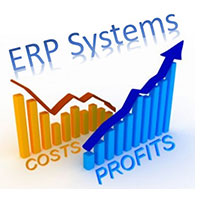

Enterprise Resource Planning (ERP) Systems are Moving to the Cloud By Maria Snyder, Senior Management Consultant
Companies are upgrading to keep up or surpass competitors and manage growth Today’s rapidly evolving ERP systems support a variety of business functions — from sales generation and fulfillment to revenue recognition and reporting. The current trend for ERP solutions is either partially or entirely Cloud-based tools as opposed to strictly on-premise computing. These new tools provide mobile accessibility and offer seamless integration with other enterprise systems. Many companies have invested time, sweat and money into their Cloud-based ERP implementation but may not be realizing optimum benefits. They need to spend time up front to properly configure their systems to best suit business needs. When moving to the Cloud, they should ensure business requirements are fully understood and drive their upgrade to deliver the expected improvements from this evolving technology leap. A comprehensive, compatible ERP system should improve performance in four major ways: 
Streamline Processes – ERP Systems are designed to create efficiencies and eliminate repetitive processes. They are built on “best practices” and provide more effective business process flows that are managed by the system, not by people or emails. This results in more uniform processes and work flows that remove second guessing of what’s next, making it faster and easier to deliver products and services and to train new resources. Reduce Costs – A natural side benefit of streamlined processes from an ERP system is improved forecasting and subsequent resource planning, which should result in inventory reduction and better supply flow. In addition, ERP systems are robust enough to provide a myriad of canned and custom reporting options eliminating spreadsheets and other manual work-arounds. As users become more self-reliant with reports and queries, it reduces the need to involve other key resources such as those from Information Technology and/or super users. Improve Customer Relationships – An ERP system will enhance the tools for entering quotes and sales orders, collecting shipping information, providing feedback to customers and recording and tracking related activities. Many ERP systems provide eCommerce capabilities and portals for customer convenience and direct order entry. An added benefit is that the more customers depend on them, the less in-house labor is required to support them, resulting in increased profitability, reduced labor costs or re-purposed activities. Enhance Data Utilization – Data collection is automated and information is housed within a single entity – a single source of truth. ERP systems have the tools and guidelines to improve data integrity and the means to enforce data security. Aside from improving data analysis and decision making, it’s even more critical to those who must protect their asset data and those who must comply with government requirements, such as Sarbanes-Oxley (SOX). ERP systems deliver these and other benefits but, most importantly, they allow companies to be more scalable as they face the challenges of growth and adapt to a changing business environment. These benefits are critical for keeping up with and surpassing competition. |
||||||


